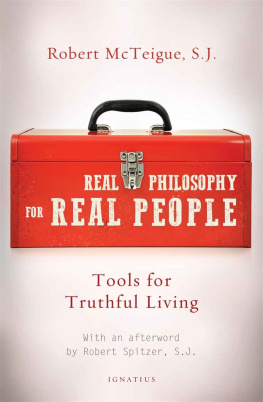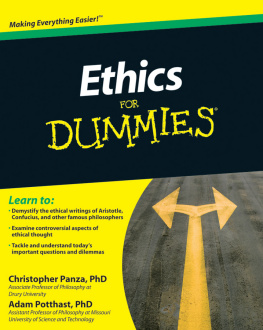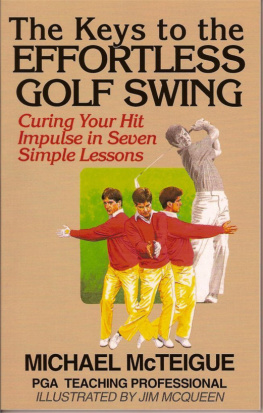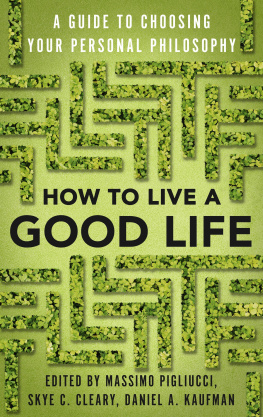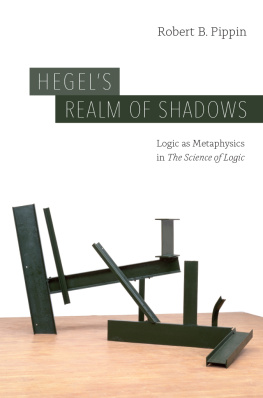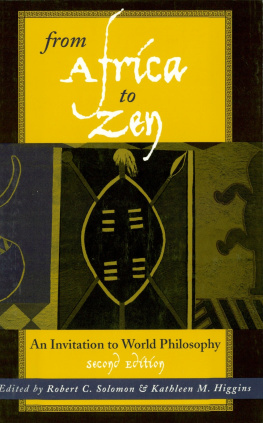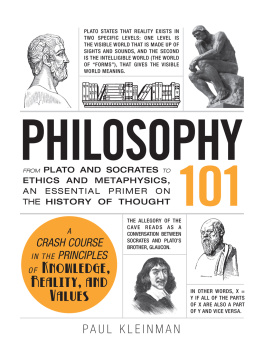REAL PHILOSOPHY FOR REAL PEOPLE
ROBERT McTEIGUE, S.J.
Real Philosophy
for Real People
Tools for Truthful Living
IGNATIUS PRESS SAN FRANCISCO
Ignatius Press thanks Southern Illinois Universtiy Press for permission to use an epigraph from Paul Weiss Modes of Being (1958).
Excerpt from The Return of the King by J. R. R. Tolkien. Copyright 1955, 1965, 1966 by J. R. R. Tolkien, renewed 1983 by Christopher R. Tolkien, John F. R. Tolkien, and Priscilla M. A. R. Tolkien; and renewed 1993, 1994 by Christopher R. Tolkien, John F. R. Tolkien, and Priscilla M. A. R. Tolkien. Reprinted by permission of Houghton Mifflin Harcourt Publishing Company. All rights reserved.
Cover art:
iStockPhoto.com/chictype
Cover design by Enrique J. Aguilar
2020 by Ignatius Press, San Francisco
All rights reserved
ISBN 978-1-62164-348-7 (PB)
ISBN 978-1-64229-130-8 (eBook)
Library of Congress Control Number 2020933578
Printed in the United States of America
A SYLLOGISM OF EPIGRAPHS
Philosophers let theories get in the way of what they and everyone else know.
Paul Weiss
Its one thing not to see the forest for the trees, but then to go on to deny the reality of the forest is a more serious matter.
Paul Weiss
In short, the case for a sort of general guidance from the start is to be found in the fact that the road is beset with traps and temptations to the loss of liberty. There are not only pitfalls, but bottomless pits; there are not only mazes, but mazes without a centre. That is why I, for one, believe in the philosophy of providing a map of the road, with all the blind alleys and broken roads marked on it from the first. But that is not in order that men should not be free to walk the roads, but rather that they should walk on the roads on which they will remain free. And until this distinction is understood the modern debate about authority and liberty will not have ended, for it will not even have begun.
G. K. Chesterton
To Paul Weiss, 19012002
He was for me a philosopher, a scholar, a teacher,
a mentor, a friend, and a father.
CONTENTS
A PARABLE
Al E. Quis and Fred are engaged in conversation.
FRED: If you punctured your foot on a rusty nail, what would you do?
AL: I would go to a doctor and get a tetanus shot.
FRED: Are you sure?
AL: Yes, of course, everyone knows thats what you do.
FRED: And if you got a paper cut, would you clean the wound with alcohol or with mud?
AL: With alcohol, of course! Everyone knows that. Its obvious!
FRED: Yes, yes it is. At least it is now... (Fred winks.)
FRED: And if you wanted to lose twenty-five pounds as quickly as possible?
AL: Well, that depends...
FRED: So it would seem. Every week, the magazine rack at the supermarket is loaded with publications promising the amazing new discovery of this or that wonder diet based on grapefruit or carrot juice or cottage cheese or aromatherapy or something .
AL: Whats your point?
FRED: Why arent the magazine racks at the supermarket filled weekly with publications announcing the great new discovery that tetanus can be treated with grapefruit or carrot juice or cottage cheese or aromatherapy or something ? Why dont these magazines announce on a weekly basis the amazing new discovery that paper cuts should be cleansed with rain water or motor oil or powdered lavender or something ?
AL: Thats crazy. How to prevent tetanus and how to clean a cut are settled questions. The answers to those questions are well established.
FRED: Yes, indeed. And how many diets have been touted in the last twenty years as the best, most reliable, fastest acting, foolproof diet?
AL: Too many to count.
FRED: Indeed. And when you go to the supermarket and you see this weeks announcement of the latest diet, do you pay close attention?
AL: Not at all.
FRED: Why not?
AL: Because diets announced in tabloids sold in supermarkets have a pitiable track record. If grapefruit mixed with catnip and dog food really was the basis for the perfect quick weight-loss diet, then that fact would become as established and well known as the prevention of tetanus or the cleansing of a wound.
FRED: Quite right. Now, in the past twenty centuries , how many philosophy texts have offered theories as the best, most reliable, and final account of a sound and livable morality? Is the number greater than the number of tabloid diets proffered in the past twenty years?
AL: Yes, the number would be much greater, I would imagine.
FRED: Ah. And yet you turn to these philosophy texts, which, on your own account, have a worse track record than tabloid diet suggestions, for wisdom about how to guide your life and how to discern right from wrong (terms for which most texts cannot even agree on a common definition). If any one of them really had truth with a capital T, wouldnt the other texts just fade away, as dangerous as alternative methods for preventing tetanus or as laughable as the latest fad diet? If you wont waste your time reading tabloid diets available in the supermarket, why do you waste your time reading philosophy texts about morality? Surely, if the Truth about right and wrong were something to be discovered and known, it would have been discovered by now. Purveyors of philosophical texts are just as much hucksters as purveyors of fad diets, and those who read such texts are as gullible as those who follow the fad diets. But those who read philosophical texts about morality are even more pitiable than desperate dieters.
AL: How can that be?
FRED: It is not contrary to reason that someone might find a most or even more reliable way to lose weight quickly. But the attempt to formulate a consistent moral theory is contrary to reason. Moral theories cannot be coherent and cannot be lived because they involve too many irreconcilable antinomies.
AL: For example?
FRED: How about these? Physical / non-physical; rational / nonrational; public / private; objective / subjective; law / freedom; duty / love; habit / spontaneity; principle / praxis; fact / value; absolute / relative. How can these be reconciled? And even if they could, in some theoretical way, be reconciled, how could such a moral theory be livable ?
AL: Are you saying that morality is meaningless?
FRED: Certainly philosophical accounts of morality, in light of the antinomies Ive just listed, are meaningless. The history of philosophical moral reflection is a collection of quaint and embarrassing conceits. A systematic, coherent account of the moral life just cant be achieved. If you want guidance in morality, just ask yourself before acting, What is the loving thing to do? That is about as reliable as any other attempt at a moral theory, and it is a lot more concise.
How should Al respond to Fred?
PREFACE
Learning to Live with Solertia
Consider this conversation between a father and son:
SON: Dad, whats the best way to avoid making bad decisions?
FATHER: Experience.
SON: Whats the best way to get experience?
FATHER: Making bad decisions.
Do you agree with the father here? Is there really any way of knowing what is good and right in this life, aside from trial and error? How can we know what to do and when to do it and the way to do it? This mysterious but real human faculty is what we call prudence, which Father William Saunders dubs the mother of all virtues. Through prudence, a person recognizes his moral duty and the good means to accomplish it. And as Saunders points out, this virtue has three layers:
To prudently examine a situation and then to determine a course of action, one must keep in mind three aspects of prudence: memoria, docilitas and solertia. Memoria simply means having a true-to-being memory which contains real things and events as they really are now and were in the past. Everyone must learn from his past experiences. Remembering what is to be done or avoided from past experiences helps to alert us to the occasions and causes of sin, to prevent us from making the same mistakes twice and to inspire us to do what is good. Be on guard: the falsification or denial of recollection is a grave impediment to exercising prudence.
Next page
